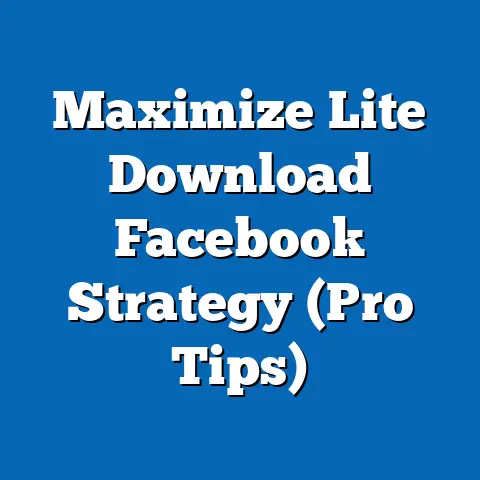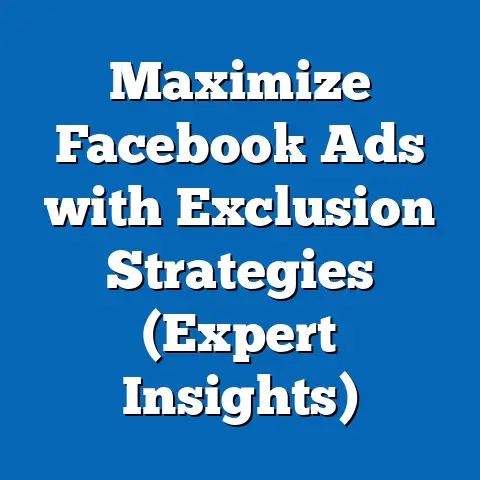Are Adult Ads Allowed on Facebook? (Essential Insights)
Understanding Facebook’s Advertising Policies
Facebook, now known as Meta, is more than just a social network; it’s a massive advertising platform.
But with great power comes great responsibility, right?
Meta has a vested interest in maintaining a safe, respectful, and inclusive environment for its billions of users.
That’s why they have pretty strict advertising policies.
I remember when I first started running ads, I thought, “Hey, it’s my money, I can advertise whatever I want!” Boy, was I wrong.
Facebook’s policies cover everything from illegal products and services to misleading claims.
And yes, adult content falls squarely under their scrutiny.
If you want to get down to the nitty-gritty, take a look at their official advertising policies.
Specifically, you’ll find sections dedicated to prohibited content, including anything that’s sexually suggestive, exploits, abuses, or endangers children, or promotes sexual services.
The policies are updated regularly, so it’s crucial to stay informed.
Takeaway: Facebook’s advertising policies are in place to protect its users and maintain a safe environment.
Familiarizing yourself with these policies is the first step in understanding what you can and cannot advertise.
The Definition of Adult Content
So, what exactly does “adult content” mean in Facebook’s eyes?
It’s not just about overtly explicit imagery.
The definition is broader and covers a range of things, including:
- Sexual Services: Ads promoting prostitution, escort services, or any form of transactional sex are strictly prohibited.
- Adult Products: While some adult toys might be allowed under specific conditions (more on that later), anything excessively graphic or focused on sexual gratification is usually a no-go.
- Explicit Imagery: This is the obvious one.
Nudity, sexual acts, and excessively suggestive poses are generally banned. - Content Exploiting, Abusing, or Endangering Children: Absolutely forbidden. This is a non-negotiable line.
I once worked with a client who was selling lingerie.
They thought they could get away with “artistic” photos that were, let’s just say, borderline.
Facebook’s algorithm caught it immediately, and their ad account was temporarily suspended.
It was a hard lesson learned.
Takeaway: Facebook’s definition of adult content extends beyond explicit imagery and includes anything that promotes sexual services or exploits individuals.
Examining the History of Adult Ads on Facebook
Facebook’s stance on adult ads hasn’t always been set in stone.
In the early days, there was a bit more leniency, or perhaps less effective enforcement.
But as the platform grew and came under increased scrutiny, the policies tightened up.
I’ve been in the digital marketing game long enough to remember when you could get away with a lot more on social media.
But those days are long gone.
Facebook has become increasingly sensitive to brand safety and user experience, which means stricter rules for advertisers.
Key policy changes over the years have included:
- Increased focus on image moderation: Facebook’s AI has become much better at detecting sexually suggestive content.
- Tighter restrictions on promoting sexual services: This was a response to concerns about human trafficking and exploitation.
- Emphasis on protecting minors: This is a top priority for Facebook, and any content that could be seen as endangering children is dealt with harshly.
Takeaway: Facebook’s policies on adult ads have evolved over time, becoming stricter in response to societal concerns and the need to maintain a safe platform.
Current Restrictions and Guidelines
Okay, let’s get down to the specifics.
What can you actually advertise on Facebook when it comes to adult-related products or services?
The answer is… it depends.
Here’s a breakdown of what’s generally allowed and what’s not:
- Allowed (with restrictions):
- Educational content about sexual health: As long as it’s presented in a respectful and informative way.
- Adult novelty items (like gag gifts): Provided they aren’t overtly sexual or graphic.
- Certain types of lingerie: As long as the images aren’t too suggestive and focus on the product itself.
- Not Allowed:
- Sexual services: No exceptions.
- Explicit imagery: Nudity, sexual acts, and excessively suggestive poses are banned.
- Content exploiting, abusing, or endangering children: Again, a non-negotiable line.
- Educational content about sexual health: As long as it’s presented in a respectful and informative way.
- Adult novelty items (like gag gifts): Provided they aren’t overtly sexual or graphic.
- Certain types of lingerie: As long as the images aren’t too suggestive and focus on the product itself.
- Sexual services: No exceptions.
- Explicit imagery: Nudity, sexual acts, and excessively suggestive poses are banned.
- Content exploiting, abusing, or endangering children: Again, a non-negotiable line.
I once saw a campaign for a sex toy company that was surprisingly successful.
They focused on the empowerment and pleasure aspects of their products, using tasteful imagery and inclusive language.
They also made sure to target an adult audience and comply with all of Facebook’s guidelines.
It’s a testament to the fact that you can advertise in this niche, but you have to be smart about it.
Takeaway: While Facebook has strict rules about adult content, there are some exceptions.
Focus on educational content, novelty items, or tasteful product displays, and always comply with their guidelines.
The Impact of Adult Ads on Facebook’s Community
The question of whether to allow adult ads on Facebook isn’t just a matter of policy; it’s a matter of community.
What impact would allowing such ads have on the platform’s users, its brand, and its overall mission?
On one hand, allowing adult ads could generate significant revenue for Facebook.
It could also cater to businesses that operate in the adult-oriented space, giving them a platform to reach their target audience.
But on the other hand, it could alienate users who are uncomfortable with such content.
It could also damage Facebook’s brand, making it seem less family-friendly and more like a haven for adult-oriented businesses.
I’ve seen firsthand how sensitive people are to this issue.
Even a slightly suggestive ad can generate a lot of negative feedback.
Facebook has to walk a fine line between catering to advertisers and protecting its users.
Takeaway: Allowing adult ads on Facebook could have both positive and negative impacts on the platform’s community.
Facebook has to carefully weigh the potential benefits against the potential risks.
Case Studies of Businesses Attempting to Advertise Adult Content
Let’s take a look at some real-world examples of businesses that have tried to advertise adult products or services on Facebook.
- Lingerie Company: As I mentioned earlier, a lingerie company tried to use “artistic” photos that were too suggestive.
Their ad account was temporarily suspended.
Lesson learned: stick to tasteful product displays. - Sex Toy Company: A sex toy company focused on empowerment and pleasure, using tasteful imagery and inclusive language.
Their campaign was successful because they complied with Facebook’s guidelines and targeted an adult audience. - Sexual Health Clinic: A sexual health clinic ran ads promoting their services.
They focused on education and awareness, using respectful language and imagery.
Their campaign was successful because it provided valuable information and didn’t violate Facebook’s policies.
I think the key takeaway from these case studies is that compliance is everything.
You can’t try to sneak anything past Facebook’s algorithm.
You have to be upfront, honest, and respectful of their policies.
Takeaway: Businesses attempting to advertise adult content on Facebook need to be aware of the platform’s restrictions and guidelines.
Compliance is key to success.
Alternatives for Adult Content Advertisers
So, if Facebook isn’t the ideal platform for advertising adult content, what are the alternatives?
Here are a few options:
- Niche Platforms: There are platforms specifically designed for adult content, like Pornhub and XVideos.
These platforms have a more permissive advertising policy. - Targeted Marketing Strategies: You can use email marketing, content marketing, and search engine optimization (SEO) to reach your target audience.
- Affiliate Marketing: Partner with other businesses in the adult space to promote your products or services.
- Influencer Marketing: Work with influencers who cater to an adult audience to promote your brand.
I’ve seen businesses have a lot of success with these alternative strategies.
It’s all about finding the right platform and the right approach.
Takeaway: While Facebook may not be the best platform for advertising adult content, there are plenty of alternatives.
Consider niche platforms, targeted marketing strategies, affiliate marketing, and influencer marketing.
Conclusion
So, are adult ads allowed on Facebook?
The short answer is: it’s complicated.
Facebook has strict policies against adult content, but there are some exceptions.
You can advertise educational content, novelty items, or tasteful product displays, but you have to comply with their guidelines.
The key takeaway is to be aware of Facebook’s policies and to be respectful of its community.
If you’re not sure whether your ad complies with their guidelines, it’s always best to err on the side of caution.
And if Facebook isn’t the right platform for your business, there are plenty of alternatives to consider.
I hope this article has given you a better understanding of Facebook’s policies on adult ads.
It’s a complex issue, but with the right approach, you can navigate it successfully.






